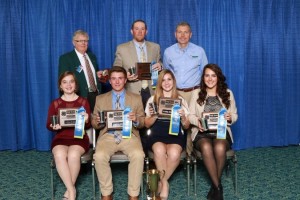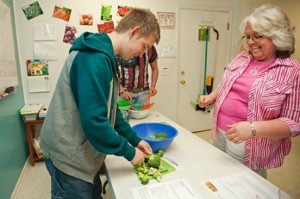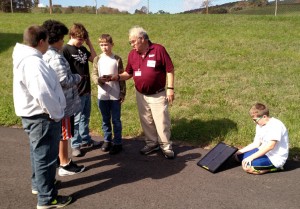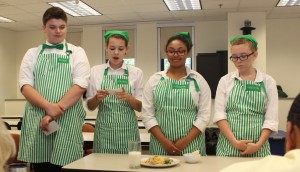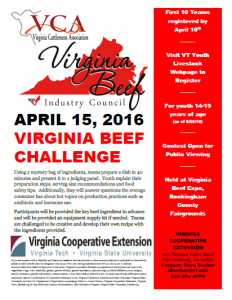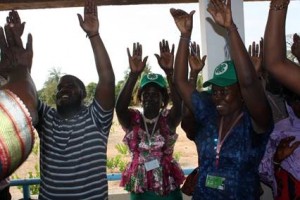On Friday March 18th, the Block and Bridle club hosted the Stockmans and Meats Judging contest and on Saturday hosted the Livestock Judging contest. There was a wonderful turnout-over 500 youth from across the state. Congratulations to all the winners. 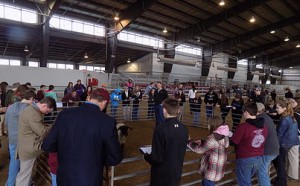
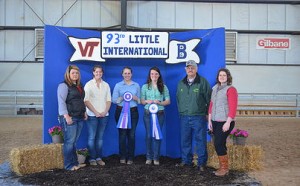
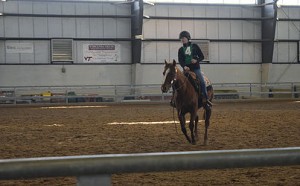
Virginia 4-H Nets Several Wins at National Contests
The Virginia 4-H Livestock Judging Team placed first and the Virginia 4-H Livestock Skillathon Team placed third at the recent North American International Livestock Exposition in Louisville, Kentucky. The event is the world’s largest purebred livestock show.
The Livestock Judging Team competed against 34 other teams in the 91st National 4-H Livestock Judging Contest and was the highest scoring team overall, with 2,525 points, followed by teams from Illinois and Georgia. As the 2015 National Champion 4-H Livestock Judging Team, the team is eligible to represent the United States at the Royal Highland Show in Scotland in June, along with the second-and third-place teams.
The Virginia team also placed first in cattle, fifth in swine, third in sheep and goat, and third in reasons.
Individual awards were garnered by Blake Hopkins, who placed fifth overall, eighth in sheep and goat, and 12th in beef cattle; Hannah Craun, who placed third overall, second in beef and performance cattle, and 11th in reasons; and Sarah Harris, who placed eighth in reasons, ninth in beef cattle, and 17th overall. Craun, Hopkins, and Harris were also named All-Americans for placing in the top 20 overall.
“The teams performed phenomenally well overall and individually,” said David Roper, 4-H youth livestock Extension specialist with Virginia Cooperative Extension and coach of the Livestock Judging Team. “I am very proud of all the work the students put into this competition and how they represented the state.”
The livestock team will travel to Europe in June 2016 and will be fundraising for the trip until then. In addition to participating in the Royal Highland Show, the group will have the opportunity to visit several other European countries to learn about their agriculture systems.
The Livestock Skillathon Team also performed well at the North American. The team placed second in identification and quality assurance, sixth in evaluation, and third overall.
Individually, John-Robert Hensley placed first in quality assurance, second in identification, and third overall; Hailey Shoemaker placed eighth in quality assurance and 10th overall; and Gracie Bailey placed 18th overall.
The Virginia 4-H Foundation’s 4-H Livestock Youth Development Endowment provided support for the teams’ travels this past fall.
The 2015 Virginia 4-H Livestock Judging Team from left, front row: Hannah Craun, Blake Hopkins, Sarah Harris, and Caley Ellington. Back row: Doyle Wolverton, sponsor; David Roper, youth livestock Extension specialist; and Todd Conway, a sponsor from Westway Foods.
Teen Cuisine Cooking Program Mixes Cooking Lessons and Life Skills
Introduce a few teenagers to some healthy ingredients, show them how to safely prepare a tasty new recipe, sprinkle in some nutrition facts, throw in a dash of fun, and voila! — those teens are on their way to making better food choices.
The Teen Cuisine cooking program is one of the many ways that Virginia Cooperative Extension’s Family Nutrition Program and Virginia 4-H are helping low-income families make informed and healthy food choices on limited budgets. The curriculum focuses on food preparation and cooking, including the safe use of knives and the importance of hand-washing.
The 4-H’ers are involved from start to finish, from the initial recipe selection to food prep, cooking, and cleanup. “The kids learn how to prepare food on their own that they would not normally cook,” said LaSonya White, a former middle school family and consumer sciences teacher who regularly used the curriculum with her students in Newport News. “We’d make colorful coleslaw to introduce the kids to a variety of vegetables. They would scrunch up their faces, but after they tried what they had made, they absolutely loved it.”
Teen Cuisine reached more than 12,000 students in 2015 and made a major impact. Nearly three-quarters of participants indicated that they are making healthier food choices as a result of Teen Cuisine. Of that group, 78 percent reported eating more fruits and vegetables, 67 percent said they drink fewer soft drinks, and 61 percent reported eating less junk food.
This program received assistance from a Walmart Youth Voice – Youth Choice grant in support of 4-H Healthy Living programs.
“From introducing these 4-H members to new foods to educating them on healthy, inexpensive food preparation techniques they can use at home, the Teen Cuisine program is making a positive impact on the healthy behaviors of these youth that will hopefully last a lifetime,” said Tonya Price, 4-H Extension specialist.
High school teacher Katherine Morris supervises Doug Gibson, a ninth-grader at LIFES Academy, as he cuts broccoli for a chicken and vegetable stir-fry.
Expansion of the 4-H Energy Program
With generous support from the Dominion Foundation, the 4-H Energy Program has expanded by building on the long-standing 4-H Electric Project popular with junior members and school partners. Recently, middle and high school 4-H and FFA members were introduced to the basic concepts of green energy. Students also learned about the role that coal and natural gas play in our state’s energy mix.
The 4-H Electric Project develops project and life skills such as decision-making, science and technology, teamwork, and communication. The project also motivates youths to explore careers in related fields. Fun-filled, hands-on learning experiences teach students and volunteers about various energy sources and help them explore the characteristics of electricity. For example, youths erect solar panels and measure the energy produced. They also construct scale-model wind turbines and perform tests to determine the most efficient turbine designs.
This year, Virginia 4-H introduced the 4-H Electric Challenge, giving youths an opportunity to gain additional energy knowledge and to test their skills through competition. Another popular component is the Youth Energy Fact of the Week, a fun fact about energy that is shared statewide.
By investing in Virginia 4-H, Dominion is helping to create an ongoing, high-quality, statewide, youth energy program.
Dan Swafford, Curriculum Specialist, teaches a group of 4-H youth about solar energy.
Up to the Challenge: Nelson Foodies Place Nationally
In just the second year of 4-H Food Challenge programming, Virginia 4-H again sent a team to the national contest at the Texas State Fair. The Nelson Foodies team — composed of Ryan Adcock, Jasmine Johnson, Olivia Johnson, and Kristyn Underwood — placed fourth overall. They were coached by Nelson County 4-H associate Extension agent Corissa Wilson.
“Our team had really strong leaders who are naturally competitive,” Wilson said. “Food Challenge pushed their teamwork and communication skills. They learned a lot about getting along and delegating tasks.”
4-H Food Challenge is a team event in which participants receive a bag of ingredients and have 40 minutes to prepare a dish, develop a presentation including the recipe’s nutrition and cost, and clean up their area. It’s fast-paced and educational, and it allows for creativity. It also tests time management, teamwork, planning, and execution skills.
Details are important throughout the contest, and each team of three to five youths must figure out how to cook the food item, incorporate at least two items from a standard pantry, practice food safety, and create a presentation that includes all the necessary requirements. One set of judges evaluates the actual preparation and teamwork, while another set listens to and scores the presentations. Presenters share information about the food groups and nutrients in their recipe. Artful arrangement of the food matters too.
Kaci Daniel, 4-H Extension agent in Orange County, served on the National 4-H Food Challenge planning team and judged the 2015 event. “It was very helpful to be on the other side of the contest, especially to see the caliber of teams at nationals,” Daniel said. “I’ve been a coach and contest organizer. Being a judge was a great professional development opportunity, allowing me to continue helping Virginia youth and volunteers improve.”
Along with Daniel, Madison County 4-H agent Kelly Mallory has been key to helping the 4-H Food Challenge spread throughout Virginia. “It’s nice to see this take off so quickly,” Mallory said. “We doubled participation from the first to the second year, and we are active in 4-H camps, clubs, special interest, and military programs. Food Challenge is relevant and accessible to urban and rural audiences, and builds the critical life skills of planning, problem-solving, and working with others.”
The Nelson Foodies’ 4-H Food Challenge career has ended, so what Virginia 4-H youth team will excel in 2016? We’ll find out at State 4-H Congress, because that’s where nationally eligible teams are decided.
Nelson Foodies Team- 4-H Food Challenge.
New Contest at Expo-Beef Challenge
Dear Colleagues –
Please check out the opportunities right around the corner!
1. We are excited for a new contest at Expo called Beef Challenge (April 15). Registration and Rules attached.
2. Also, we invite All Virginia counties with 4-H Livestock Programs to participate in the Northern District Livestock Judging Contest (May 14). Information is attached. Register by May 6th.
Northern District Livestock Judging packet 2016
Please let me know as you have questions!
Dara
Dara Booher, M.Agr.
Extension Agent, 4-H Youth Development
965 Pleasant Valley Road
Harrisonburg, VA 22801-9630
Phone: 540/564-3080
Fax: 540/564/3093
Email: dbooher@vt.edu
“I think a good teacher of young children should try to be all-seeing, rather than all-knowing; a good listener, rather than a constant talker. The emphasis should be on observation and interpretation, rather than relying on past experience for solving every problem that arises.”
~Carol Hillman
Director’s Update
Hi Everyone,
I hope your spring programming is going well. It was great to see a record number of young people competing this past weekend at the B&B contests. It was equally exciting to be able to interact with new VCE faculty this week at their orientation. During the discussion, I shared with agents that in addition to the Virginia and National 4-H Curriculum, they could find some great resources in the National Directory of 4-H Educational Materials. I have attached some information on this. You can search by subject matter and you can also find the process for posting materials that you would like to share. The link will take you to my4-H and you will be asked to register to view materials.
While on 4-H.org check out common measures under resources. Common Measures is helping 4-H continually improve programs so that we can reach even more young people with a life-changing 4-H experience. It assesses the impact of 4-H through science, healthy living, citizenship and college/career readiness. These evaluation measurements also assist in cross-program comparison by allowing various programs to be examined on similar outcomes and outputs. The common measures have been placed into VCE Qualtrics surveys. To get started using these in your programming efforts visit http://www.intra.ext.vt.edu/4h/Commonmeasures.html .
I want to thank those working as part of a VCE program team. The teams are making great progress and are bringing the VCE programming process to life at the state level. I would encourage you to explore the teams and their work at http://www.intra.ext.vt.edu/reports/programteamresources.html . Further, under new leadership, the university is embarking on some key initiatives which I think align very nicely with our programming efforts. If you have not heard of the Virginia Tech Destination Areas, please take a few minutes to scan the site http://www.beyondboundaries.vt.edu/destination-areas.html . I am enthusiastic about the new partnerships forming campus-wide and that both the President and Provost see Extension as a valuable asset to the University in serving citizens across the state.
Finally, in case you are not Facebook friends with Ruth Wallace or Reggie Morris, I included a picture below. Reggie, Ruth, Kathleen Jamison, Ozzie Abaye, and Tom Archibald are part of our VCE team currently working in Senegal, engaging youth and adults in 4-H positive youth development. I could not be more proud!
4-H Grows in your community, in Virginia, in our country, and indeed throughout the world!
Remember to schedule time for yourself. I know from experience spring in the local Extension office and 4-H Centers can be extremely busy.
Thanks for all you do,
Cathy
Cathy M. Sutphin, PhD
Associate Director, 4-H
115 Hutcheson Hall
Blacksburg, VA 24061
540-231-6372
NationalDirectory0f4HMaterialsSubmissionInformation
Save
4-H Mentor Q&A: Yvonne Earvin
We continue celebrating and highlighting 4-H Mentoring programs across the country, and the mentors who have changed the lives of youth in their communities by serving as role models, educators, life coaches and friends. We are proud to feature the 4-H Youth and Families with Promise (YFP) Mentoring Program at Virginia Tech.
 The 4-H YFP is a national program implemented to increase the developmental assets of youth and their families.
The 4-H YFP is a national program implemented to increase the developmental assets of youth and their families.
We spoke with Yvonne Earvin, Mentor Educator in Cumberland County, Virginia, who shared her thoughts and success of 4-H YFP in Virginia and her personal insights.
Click here to read more from the 4-H Today article
Honoring Clyde F. Jackson
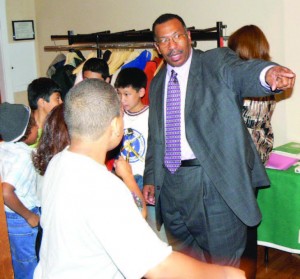 On Oct. 19, 2015, Clyde F. Jackson was inducted posthumously into the National 4-H Hall of Fame. Jackson was a pioneer in every sense of the word. Jackson grew up in the 4-H program and often spoke of the importance his 4-H experience had in shaping his life. He was elected the first president of the Black Virginia 4-H Youth Program, serving from 1967 to 1968, and was one of seven African-American youth leaders to attend the first integrated State 4-H Congress. Jackson went on to attend the National 4-H Congress.
On Oct. 19, 2015, Clyde F. Jackson was inducted posthumously into the National 4-H Hall of Fame. Jackson was a pioneer in every sense of the word. Jackson grew up in the 4-H program and often spoke of the importance his 4-H experience had in shaping his life. He was elected the first president of the Black Virginia 4-H Youth Program, serving from 1967 to 1968, and was one of seven African-American youth leaders to attend the first integrated State 4-H Congress. Jackson went on to attend the National 4-H Congress.
He served for more than 29 years as a 4-H agent in Fairfax and Prince William counties. He was president of the National Association of 4-H Agents and a member of the board of directors of the Joint Council of Extension Professionals. After retiring in 2008, he continued to follow his passion by establishing 4-H Clubs on military installations and working with the geographically dispersed military youth through programs and resources to help them deal with the deployment of a loved one. Jackson’s extraordinary work was recognized with several awards, including the Meritorious Service Award from the National Association of Extension 4-H Agents for his leadership and work with at-risk youth.
Throughout his career, Jackson was a positive role model for youth and adults. His was extremely talented in making people feel at ease, finding common ground, and forming partnerships. He listened to each person and valued what each said. Jackson reminded us to remain flexible and to watch for opportunities to help people grow. He said more than once that if you try to plan everything, you’ll miss some great opportunities that just happen to come by. Jackson is remembered as a pioneer and as a champion for youth from all walks of life. He is also remembered for his gentle leadership style and his ever-present smile that warmed any room he entered.
Chair’s Update
Dear Friends,
4-H continues to be one of the most successful and positive youth development programs ever evaluated. You certainly don’t have to look far to see the impact — Virginia is blanketed with outstanding 4-H agents, volunteers, and programs that make a difference.
The vision of the Virginia 4-H Foundation is to invest in 4-H to ensure that this important work continues in the future. Virginia needs what 4-H has to offer, and with your help we can expand our reach and increase enrollment.
One specific area where we are making progress is in helping counties and unit offices establish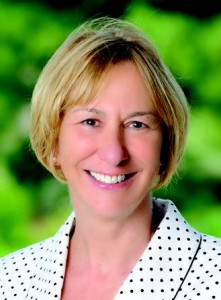 local endowments. Local county endowments put resources directly in the hands of the local 4-H agent, where they can be used as needed. Today, 33 localities benefit directly from local endowments, and several more are underway. We won’t be satisfied until every locality has a local endowment. I know this is a reachable goal; we just have to start the conversation and get he creativity moving.
local endowments. Local county endowments put resources directly in the hands of the local 4-H agent, where they can be used as needed. Today, 33 localities benefit directly from local endowments, and several more are underway. We won’t be satisfied until every locality has a local endowment. I know this is a reachable goal; we just have to start the conversation and get he creativity moving.
Establishing a local endowment requires an investment of at least $25,000, which can be raised over a five-year period. Some examples for funding include five people pledging $1,000 a year for five years, 250 people giving a one-time gift of $100 each, or a little of both pledges and gifts. In any of these cases, the endowment can be established. Some localities have chosen an individual to honor, and others have named the endowment for the locality. There are so many wonderful opportunities to consider, and the local offices can determine what works best for them.
Imagine a 4-H endowment in every locality.I know I do! And, I know for certain that this goal is within our reach. When we reach this goal, I’m sure we’ll ask ourselves, “Why didn’t we do this sooner?” Come, join with us, and invest in 4-H now to create a lasting legacy. I welcome the opportunity to visit with you and learn more about your ideas on how we are going to ensure 4-H forever. I suspect you agree with me that “4-H forever” is a vision worth our investment.
I look forward to hearing from you.
Sincerely,
Mary Miller, Ph.D.
Chair, Virginia 4-H Foundation

